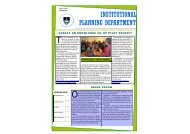What does it mean to be suicidal? - University of Cape Town
What does it mean to be suicidal? - University of Cape Town
What does it mean to be suicidal? - University of Cape Town
Create successful ePaper yourself
Turn your PDF publications into a flip-book with our unique Google optimized e-Paper software.
<strong>What</strong> <strong>does</strong> <strong>it</strong> <strong>mean</strong> <strong>to</strong> <strong>be</strong> <strong>suicidal</strong>?<br />
Although most young people think about death <strong>to</strong> some degree, <strong>suicidal</strong> thinking occurs w<strong>it</strong>hin a<br />
very particular context. When emotional pain, feelings <strong>of</strong> hopelessness or a relative inabil<strong>it</strong>y <strong>to</strong> know<br />
how <strong>to</strong> cope w<strong>it</strong>h life circumstances <strong>be</strong>comes <strong>to</strong>o much <strong>to</strong> <strong>be</strong>ar, individuals may find themselves<br />
consciously considering the possibil<strong>it</strong>y <strong>of</strong> ending their life. Suicidal thoughts can range from thoughts<br />
<strong>of</strong> <strong>be</strong>ing ‘<strong>be</strong>tter <strong>of</strong>f dead’ <strong>to</strong> actively thinking about and planning how one might kill oneself. People<br />
who feel this way are characteristically feeling unable <strong>to</strong> find another <strong>mean</strong>s <strong>of</strong> coping w<strong>it</strong>h their life<br />
s<strong>it</strong>uation and are thus expressing a desperate need <strong>to</strong> bring an end <strong>to</strong> their difficulties.<br />
Who are most at risk?<br />
Unfortunately, suicide attempts are not all that uncommon and<br />
are most frequently associated w<strong>it</strong>h the experience <strong>of</strong> depression.<br />
Worldwide, suicide is among the <strong>to</strong>p three causes <strong>of</strong> death for<br />
people aged 15 – 44 years, and is the second leading cause <strong>of</strong><br />
death amongst univers<strong>it</strong>y students (World Health Organization,<br />
2010). South Africa has the eighth highest rate <strong>of</strong> suicide in the<br />
world: each year, approximately six <strong>to</strong> eight thousand people<br />
comm<strong>it</strong> suicide, making suicide the third greatest cause <strong>of</strong><br />
For every fatal suicide<br />
in South Africa there<br />
are 20 suicide<br />
attempts<br />
(www.health24.com)<br />
unnatural death in the country, after homicide and unintentional causes. Young adults (19-24 years<br />
<strong>of</strong> age) are considered <strong>to</strong> <strong>be</strong> the most at-risk group for depression and <strong>suicidal</strong><strong>it</strong>y (including <strong>suicidal</strong><br />
thinking; self-harming <strong>be</strong>haviour and suicide attempts).<br />
Why Are South African Youths<br />
At Risk?<br />
S.A. Suicide Statistics:<br />
‘667 deaths by suicide The socio-economic context has significant <strong>be</strong>aring on the prevalence<br />
every month, 154 per <strong>of</strong> suicide in South Africa: w<strong>it</strong>h high unemployment rates and thus<br />
week, 22 every day and high levels <strong>of</strong> poverty, South African youths are confronted w<strong>it</strong>h<br />
virtually 1 every hour’ significant educational and socio-economic demands – an experience<br />
that can feel both overwhelming and paralysing, most especially<br />
when one is attempting <strong>to</strong> negotiate the significant and already<br />
challenging trans<strong>it</strong>ions and adjustments that adolescence and early adulthood can bring.
Most Significant Precip<strong>it</strong>a<strong>to</strong>rs <strong>of</strong> Suicidal Behaviour in South Africa<br />
• Academic related problems (including parental expectations around academic performance<br />
and career choices): e.g., poor academic performance, academic failure or academic<br />
exclusion<br />
• Interpersonal problems: e.g., romantic relationship difficulties; peer group difficulties like<br />
bullying; social isolation and thus a lack <strong>of</strong> social support<br />
• Family problems: e.g., disrupted family environments; broken family relationships; adverse<br />
parent-child interactions; violent abuse in the home<br />
• Past or present physical or sexual trauma<br />
• Mental health problems: most especially depression or a severe mood disorder (e.g., BiPolar<br />
Disorder)<br />
• High levels <strong>of</strong> stress and an accompanying sense that one is unable <strong>to</strong> cope<br />
Certain fac<strong>to</strong>rs can increase the risk that an individual would attempt or comm<strong>it</strong> suicide. These<br />
include:<br />
• Previous suicide attempts: youths who have attempted suicide <strong>be</strong>fore are particularly<br />
vulnerable (<strong>be</strong>tween 20 and 50 percent <strong>of</strong> youths who comm<strong>it</strong> suicide have a his<strong>to</strong>ry <strong>of</strong><br />
previous attempts (www.youthspace.me).<br />
• Substance abuse: individuals who abuse or are dependent on alcohol (<strong>it</strong>self a ‘depressant’)<br />
or drugs are at a greater risk for <strong>suicidal</strong> <strong>be</strong>haviour. Approximately one in three adolescents<br />
who die by suicide have <strong>be</strong>en under the influence <strong>of</strong> alcohol at the time <strong>of</strong> death (Hous<strong>to</strong>n,<br />
Haw<strong>to</strong>n & Shepperd, 2001)<br />
• Exposure <strong>to</strong> violence: e.g., family violence; gender based violence; criminal violence; sexual<br />
violence<br />
• Absence or loss <strong>of</strong> social support systems: w<strong>it</strong>hin familial (e.g., parental <strong>be</strong>reavement) or<br />
peer context<br />
• Family his<strong>to</strong>ry <strong>of</strong> <strong>suicidal</strong> <strong>be</strong>haviour or successful suicide attempts<br />
• Childhood abuse (physical or sexual)<br />
• Life threatening illness: e.g., an increased likelihood <strong>of</strong> <strong>suicidal</strong> <strong>be</strong>haviour in HIV/AIDS<br />
patients has <strong>be</strong>en found<br />
• Personal<strong>it</strong>y style: individuals prone <strong>to</strong> impulsiv<strong>it</strong>y or reactionary ways <strong>of</strong> coping may <strong>be</strong> at<br />
greater risk<br />
• Those outside <strong>of</strong> the ‘major<strong>it</strong>y’: research suggests that those individuals who are more<br />
isolated from ‘mainstream’ society (e.g., the homeless, immigrants, refugees, individuals<br />
w<strong>it</strong>h sexual orientations that differ from heterosexual norms)
Warning Signs <strong>of</strong> Suicide<br />
• Talking or joking about suicide<br />
• Depression: individuals who are depressed may feel hopeless; may lose interest in doing<br />
anything or may w<strong>it</strong>hdraw from friends and family. They may also impress as down, or sad.<br />
• Self-cr<strong>it</strong>icism/minimization: individuals who feel <strong>suicidal</strong> may reflect on themselves in highly<br />
negative ways, e.g., ‘I can’t do anything right’; ‘I’m pathetic’. It is always important <strong>to</strong> note<br />
any marked discrepancy in, or shift in intens<strong>it</strong>y <strong>of</strong>, an individual’s <strong>be</strong>haviour – not all people<br />
who are self-cr<strong>it</strong>ical are <strong>suicidal</strong><br />
• Changes in personal<strong>it</strong>y: someone who is usually sociable, may not want <strong>to</strong> go out, may<br />
<strong>be</strong>come negative, aggressive or irr<strong>it</strong>able and may thus w<strong>it</strong>hdraw themselves from<br />
friendships.<br />
• Loss <strong>of</strong> interest in appearance or drop in hygiene: if an individual s<strong>to</strong>ps caring about what<br />
they look like, don’t bother <strong>to</strong> get dressed or even s<strong>to</strong>p washing and bathing themselves –<br />
these could <strong>be</strong> serious indica<strong>to</strong>rs that they are not coping effectively.<br />
• Risk-taking <strong>be</strong>haviour: <strong>of</strong>ten people who are feeling <strong>suicidal</strong> engage in risky, dangerous<br />
things like drinking and driving, having unprotected sex or taking drugs.<br />
• Excessive feelings <strong>of</strong> guilt, self-blame and subjective sense <strong>of</strong> failure: if someone is<br />
depressed they <strong>of</strong>ten feel guilty and blame themselves.<br />
• Suddenly feeling <strong>be</strong>tter: if an individual has <strong>be</strong>en severely depressed, hasn’t <strong>be</strong>en on any<br />
form <strong>of</strong> treatment and is suddenly ‘back <strong>to</strong> normal’ this could <strong>be</strong> a dangerous sign. It may<br />
<strong>mean</strong> that they have set a date for their suicide and know that they will <strong>be</strong> able <strong>to</strong> end their<br />
distress soon<br />
If You’re Having Suicidal Thoughts<br />
It can <strong>be</strong> extremely frightening <strong>to</strong> have <strong>suicidal</strong> thoughts – even briefly. As a result, <strong>it</strong> can feel very<br />
difficult <strong>to</strong> talk <strong>to</strong> someone about them. You are not crazy, weak or bad for experiencing such<br />
thoughts: disclosing <strong>to</strong> someone that you’re feeling <strong>suicidal</strong> takes significant courage. Furthermore,<br />
if you tell someone there is a greater chance that they can help share the emotional burden leaving<br />
you feeling less overwhelmed.<br />
Coping yourself<br />
If you are feeling depressed or <strong>suicidal</strong> <strong>it</strong> is advisable <strong>to</strong> seek immediate help from a health<br />
pr<strong>of</strong>essional. However, there are a num<strong>be</strong>r <strong>of</strong> things that you can do <strong>to</strong> help yourself negotiate these<br />
difficult feelings. The following information is <strong>of</strong>fered as a <strong>mean</strong>s <strong>of</strong> assisting w<strong>it</strong>h immediate<br />
containment until you can seek appropriate help and intervention:
• Do remove any <strong>mean</strong>s <strong>of</strong> harming yourself from the house: e.g., do not keep large<br />
quant<strong>it</strong>ies <strong>of</strong> medication in the house<br />
• Do seek help if you feel you may <strong>be</strong> unable <strong>to</strong> cope independently and are at risk for selfharm<br />
• Do something you enjoy doing: <strong>it</strong>’s not very likely that you will feel like you have the energy<br />
<strong>to</strong> do anything enjoyable, however, <strong>it</strong> may help your mood and keep your mind distracted<br />
• Do exercise and eat well: this may help lift your mood<br />
• Do make a 48 hour pact w<strong>it</strong>h yourself or a significant other: agree that you will refrain from<br />
doing anything about the way you’re feeling for 48 hours. This may give you time <strong>to</strong> assess<br />
whether you still feel this way.<br />
• Do get in contact w<strong>it</strong>h someone you trust at regular intervals <strong>to</strong> make sure you’re okay: If<br />
you feel that there is no one <strong>to</strong> confide in you could make contact w<strong>it</strong>h a support service<br />
that is available 24hours.<br />
• Do Not take alcohol or drugs: these are only temporary escapes from real<strong>it</strong>y, and will not<br />
help you deal w<strong>it</strong>h the s<strong>it</strong>uation. Because alcohol and some illic<strong>it</strong> substances (e.g., cannabis)<br />
are depressants – they will only serve <strong>to</strong><br />
exacerbate your mood and thus reinforce<br />
your negative thoughts and feelings.<br />
• Do Not spend long periods <strong>of</strong> time alone:<br />
even if you feel the need <strong>to</strong> w<strong>it</strong>hdraw from<br />
your usual social context, do attempt <strong>to</strong><br />
spend time w<strong>it</strong>h others.<br />
Seeking Pr<strong>of</strong>essional Assistance<br />
If you are feeling <strong>suicidal</strong> <strong>it</strong> is <strong>be</strong>st <strong>to</strong> seek assistance from a health pr<strong>of</strong>essional: this could <strong>be</strong> a GP or<br />
a psychologist. The treatment <strong>of</strong>fered will depend on the kind <strong>of</strong> pr<strong>of</strong>essional assistance you seek:<br />
GP: As <strong>suicidal</strong> thinking is <strong>of</strong>ten related <strong>to</strong> depression, your GP may discuss the option <strong>of</strong> antidepressant<br />
medication. He/She may also suggest a<br />
referral <strong>to</strong> a psychologist.<br />
UCT Student Wellness Service:<br />
Psychologist: If you are referred <strong>to</strong> a psychologist you<br />
will undergo a psychological assessment which<br />
involves talking <strong>to</strong> the psychologist about your his<strong>to</strong>ry,<br />
when the <strong>suicidal</strong> thoughts <strong>be</strong>gan and what fac<strong>to</strong>rs in<br />
your life might serve <strong>to</strong> maintain or exacerbate them.<br />
Emergency Crisis Lines/Services:<br />
Suicide Crisis Line (8am – 8pm):<br />
0800 567 567 or SMS 31393<br />
Life Line Western <strong>Cape</strong> Crisis Line:<br />
021 461 1111<br />
Suicide Crisis: 0800 12 13 14<br />
28 Rhodes Avenue<br />
Mowbray<br />
7700<br />
Tel: 021 650 1017
A psychologist will also want <strong>to</strong> assess the future risk <strong>of</strong> you attempting suicide and will assist in<br />
trying <strong>to</strong> develop an appropriate intervention or management strategy (this may involve making<br />
contact w<strong>it</strong>h a significant other; assisting you in seeking containment and possibly referring you <strong>to</strong> a<br />
medical health pr<strong>of</strong>essional for psychopharmacological management). The psychologist may also<br />
recommend that you attend regular psychotherapy which would facil<strong>it</strong>ate your developing a <strong>be</strong>tter<br />
understanding <strong>of</strong> your <strong>be</strong>haviour, thoughts and feelings and thus establish more adaptive ways <strong>of</strong><br />
negotiating your internal and external experiences.<br />
Helping a Friend or Family Mem<strong>be</strong>r<br />
If a family mem<strong>be</strong>r or friend confides in you that they are experiencing <strong>suicidal</strong> thoughts <strong>it</strong> is<br />
important <strong>to</strong> consider how challenging and risky <strong>it</strong> may have felt for them <strong>to</strong> do so. It is qu<strong>it</strong>e<br />
possible that this person is fearful <strong>of</strong> <strong>be</strong>ing judged. W<strong>it</strong>h this in mind, <strong>it</strong> may <strong>be</strong> useful <strong>to</strong> consider<br />
the following:<br />
• It is really important <strong>to</strong> take a disclosure <strong>of</strong> <strong>suicidal</strong><br />
thinking or intent seriously: <strong>it</strong> is a myth that people who<br />
talk about suicide are less likely <strong>to</strong> follow through w<strong>it</strong>h <strong>it</strong><br />
• Don’t panic: knowing that someone you care about is<br />
<strong>suicidal</strong> can <strong>be</strong> emotionally distressing. It is important<br />
that you don’t make them feel guilty for confiding in you.<br />
It is also important <strong>to</strong> note that talking about <strong>suicidal</strong><br />
feelings and thoughts is less likely <strong>to</strong> reinforce the<br />
thoughts and feelings and more likely <strong>to</strong> leave the<br />
person feeling less isolated and more supported – which<br />
could assist in them finding more adaptive ways <strong>of</strong> engaging w<strong>it</strong>h their experience.<br />
• Empathise w<strong>it</strong>h their expressed emotions: try <strong>to</strong> listen <strong>to</strong> what the person is saying <strong>to</strong> you<br />
and avoid interrupting the person until you are certain that they are finished.<br />
• Offer your support and listen <strong>to</strong> what the person has <strong>to</strong> say: let them know how much you<br />
care about them and enquire about how they feel you might <strong>be</strong> able <strong>to</strong> <strong>be</strong>st support them.<br />
This might involve talking about ways in which the person can stay<br />
Suicide Should Never Be A Secret:<br />
Even if you’re sworn <strong>to</strong> secrecy and<br />
you feel that you would <strong>be</strong><br />
<strong>be</strong>traying your friend if you<br />
disclosed the information <strong>to</strong><br />
another person, you should still<br />
seek help as soon as possible. It is<br />
always safest <strong>to</strong> get help (SADAG)<br />
safe until they can acquire appropriate help (e.g., a counselling<br />
appointment), or contracting w<strong>it</strong>h them that they make contact<br />
w<strong>it</strong>h you (or approach you) should they <strong>be</strong> feeling unable <strong>to</strong> cope<br />
• Help <strong>to</strong> keep them distracted and socialised: do not let a<br />
<strong>suicidal</strong> individual spend large amounts <strong>of</strong> time alone w<strong>it</strong>hout<br />
having something constructive or engaging <strong>to</strong> do.<br />
• If possible, encourage them <strong>to</strong> contact their local GP, local<br />
counselling service or an anonymous phone line like the Suicide<br />
Crisis Line or the Life Line crisis service.<br />
• Try <strong>to</strong> <strong>be</strong> as non-judgemental as possible<br />
‘People that are <strong>suicidal</strong> have<br />
<strong>of</strong>ten <strong>to</strong>ld someone close <strong>to</strong> them<br />
that they want <strong>to</strong> die, feel they<br />
have no future or that they would<br />
<strong>be</strong> ‘<strong>be</strong>tter <strong>of</strong>f dead’. If someone is<br />
talking about suicide <strong>it</strong> is<br />
important that they get help as<br />
soon as possible’<br />
(www.youthspace.me)
• Try <strong>to</strong> avoid minimising the problems that may have led <strong>to</strong> the <strong>suicidal</strong> thoughts: saying<br />
something like ‘<strong>it</strong>’s not that bad’ is not helpful.<br />
References:<br />
Hassen, S (2011). South Africa Sees Spike in Suicide Rate. Available at<br />
http://www.presstv.ir/detail/165593.html<br />
Schlebusch, L (2008). Current Perspectives on Suicidal Behaviour in South Africa.<br />
The South African Depression and Anxiety Group (2012) Teen Suicide Prevention: Suicide Shouldn’t<br />
Be a Secret. Available at<br />
http://www.sadag.org/index.php?option=com_content&view=article&id=1295&Itemid=463<br />
Venter, B (2004). High Suicide Rate Has Parents on Edge. Available at<br />
http://www.iol.co.za/news/south-africa/high-suicide-rate-has-parents-on-edge-1.21772<br />
Youthspace – Birmingham & Solihull Mental Health Trust (2012), available at<br />
http://www.youthspace.me/SuicidalThoughts/SuicidalThoughts.aspx
















